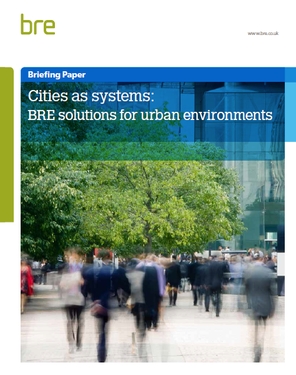Cities as systems - BRE Solutions for urban environments
The BRE Trust Future Cities research programme was carried out between 2012 and 2015 in collaboration with over 70 public and private partners. The collective value of the projects undertaken was more than £30m. The programme addressed the challenges facing urban developments as global population increases and there is continued migration to cities.
On 9 March 2015, the BRE Trust issued a report on the results of Future Cites programme, Cities as systems - BRE Solutions for urban environments which highlighted that urban areas are growing by 1.3 million people every week and that they consume 75% of natural resources.
The report addresses four main components of future cities:
- Smart cities, supported by life enhancing technology.
- Liveable cities, that underpin good quality of life.
- Healthy cities, that support wellbeing and equality.
- Resilient cities, that can withstand and mitigate extreme weather, natural disasters, social upheaval, and cyber and security threats.
- Developing an urban circular economy: comparing data from cities in the UK and Brazil to map out the waste resources, current resource management practices and the potential gains through reuse, recycling and recovery on a city scale.
- Healthy Cities Index: developing a science-based benchmarking tool cities can use to understand and improve the impact of the built environment on health.
- Energy optimisation: developing optimisation solutions for the use, generation and storage of energy at the building and district scale.
- Sustainable urban development in Brazil: scoping a balanced scorecard framework for evaluating large-scale social housing delivery across Brazil.
- Air quality, indoor environments and adaptability: analysis of the impact of external pollutants on the indoor environment and occupants in homes, hospitals and schools.
- Future city modelling: developing a new approach for digitally modelling new and existing buildings at city-scale.
- Digital interoperability: creating standards and accreditation for the interoperability of smart technologies.
- Cyber security and digital systems: addressing the security threats of connected devices in homes and the potential for standards to overcome these risks.
- Imaging tool for future district heat networks: developing an imaging tool designed to increase confidence and deployment of district heating networks in city buildings.
- Approaches to refurbishing existing housing stock: helping identify the key enablers of success for volume refurbishment of high rise properties.
- Crime in urban areas: exploring the relationship between recorded crime and the characteristics of the built environment that may increase the fear of crime.
The programme delivered tools, guidance and standards that will benefit a range of stakeholders across the built environment.
BRE author Helen Pineo said, “By 2050 there will be two and a half billion more people living in cities. We must develop our urban spaces to meet their needs but the challenges are significant: reduced public sector finances, limited natural resources, climate change mitigation and adaptation, and an ageing population. This BRE Trust research aims to plug the knowledge gaps so we can adopt an informed and strategic approach to growing and evolving our cities so they become even better places for people to live and work in - our future depends on it.’ (Ref. Key future city challenges are tackled by BRE Trust research programme 9 March 2015.)
Key research topics from the Future Cities research programme will continue to be funded by the BRE Trust along with a new programme focussing on built environment resilience. The next steps will involve product development and continued research activities in a number of key areas, including:
- Healthy cities (including ageing population and air quality).
- Interactive and connected components in buildings and infrastructure.
- Sustainable energy generation and demand optimisation.
The BRE Trust was set up in 2002 to advance knowledge, innovation and communication for public benefit. It is the largest UK charity dedicated to research and education in the built environment, commissioning research and publishing project findings to provide authoritative guidance to the construction industry.
[edit] Related articles on Designing Buildings
- Are electric bikes the future?
- Balanced scorecard.
- Building Research Establishment BRE.
- BRE Trust.
- BREEAM.
- Changing lifestyles.
- Compact sustainable city.
- Connecting people and places.
- Engineering Smart Cities.
- Inclusive design.
- Infrastructure.
- Masterplanning.
- Megacity.
- Mixed use development.
- Smart buildings.
- Smart cities design timeframe.
- Smart construction.
- Smart technology.
- The case for a new road-user charging scheme in London
- Tokyo.
Featured articles and news
Repairing historic stone and slate roofs
The need for a code of practice and technical advice note.
UKCW London to tackle sector’s most pressing issues
AI and skills development, ecology and the environment, policy and planning and more.
Managing building safety risks
Across an existing residential portfolio; a client's perspective.
ECA support for Gate Safe’s Safe School Gates Campaign.
Core construction skills explained
Preparing for a career in construction.
Retrofitting for resilience with the Leicester Resilience Hub
Community-serving facilities, enhanced as support and essential services for climate-related disruptions.
Some of the articles relating to water, here to browse. Any missing?
Recognisable Gothic characters, designed to dramatically spout water away from buildings.
A case study and a warning to would-be developers
Creating four dwellings... after half a century of doing this job, why, oh why, is it so difficult?
Reform of the fire engineering profession
Fire Engineers Advisory Panel: Authoritative Statement, reactions and next steps.
Restoration and renewal of the Palace of Westminster
A complex project of cultural significance from full decant to EMI, opportunities and a potential a way forward.
Apprenticeships and the responsibility we share
Perspectives from the CIOB President as National Apprentice Week comes to a close.
The first line of defence against rain, wind and snow.
Building Safety recap January, 2026
What we missed at the end of last year, and at the start of this.





















